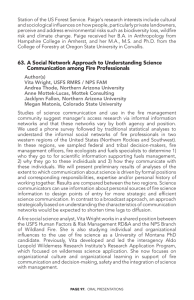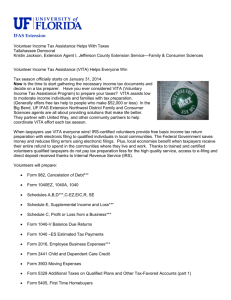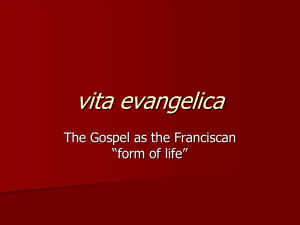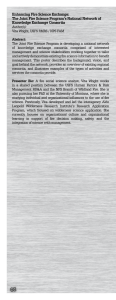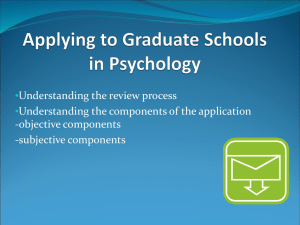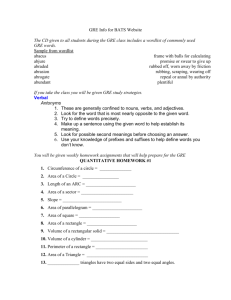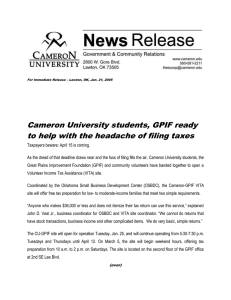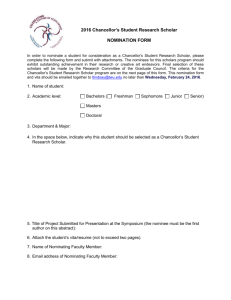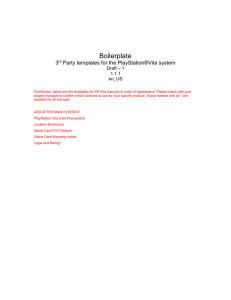How to Maximize Your Prospects at an R1 School
advertisement
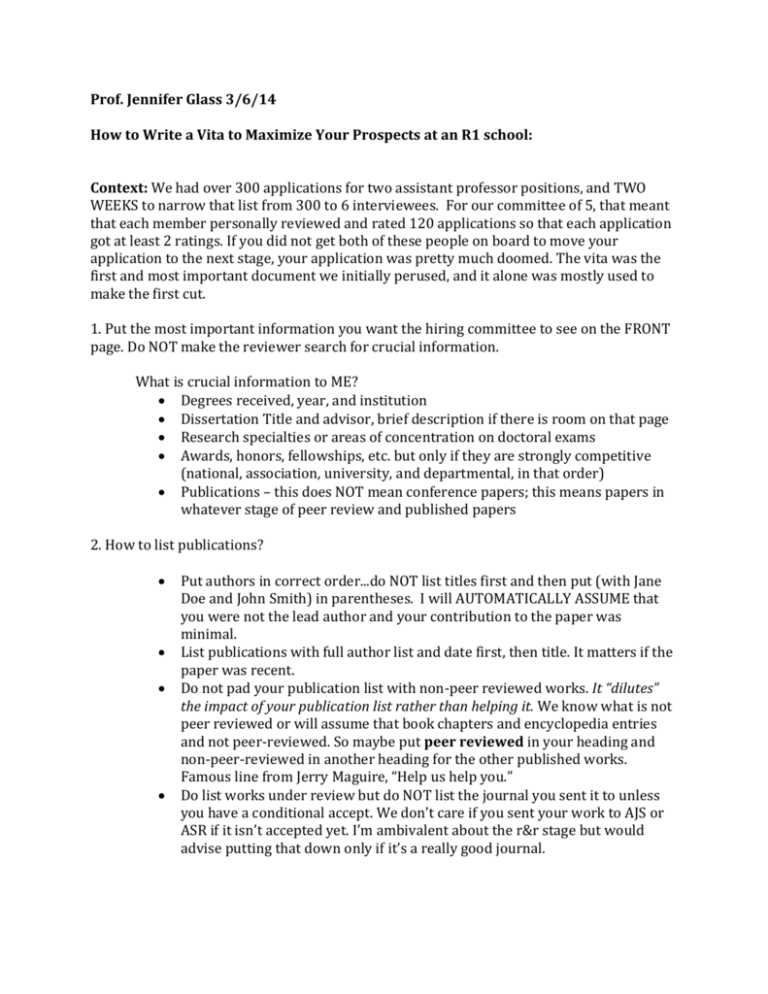
Prof. Jennifer Glass 3/6/14 How to Write a Vita to Maximize Your Prospects at an R1 school: Context: We had over 300 applications for two assistant professor positions, and TWO WEEKS to narrow that list from 300 to 6 interviewees. For our committee of 5, that meant that each member personally reviewed and rated 120 applications so that each application got at least 2 ratings. If you did not get both of these people on board to move your application to the next stage, your application was pretty much doomed. The vita was the first and most important document we initially perused, and it alone was mostly used to make the first cut. 1. Put the most important information you want the hiring committee to see on the FRONT page. Do NOT make the reviewer search for crucial information. What is crucial information to ME? Degrees received, year, and institution Dissertation Title and advisor, brief description if there is room on that page Research specialties or areas of concentration on doctoral exams Awards, honors, fellowships, etc. but only if they are strongly competitive (national, association, university, and departmental, in that order) Publications – this does NOT mean conference papers; this means papers in whatever stage of peer review and published papers 2. How to list publications? Put authors in correct order...do NOT list titles first and then put (with Jane Doe and John Smith) in parentheses. I will AUTOMATICALLY ASSUME that you were not the lead author and your contribution to the paper was minimal. List publications with full author list and date first, then title. It matters if the paper was recent. Do not pad your publication list with non-peer reviewed works. It “dilutes” the impact of your publication list rather than helping it. We know what is not peer reviewed or will assume that book chapters and encyclopedia entries and not peer-reviewed. So maybe put peer reviewed in your heading and non-peer-reviewed in another heading for the other published works. Famous line from Jerry Maguire, “Help us help you.” Do list works under review but do NOT list the journal you sent it to unless you have a conditional accept. We don’t care if you sent your work to AJS or ASR if it isn’t accepted yet. I’m ambivalent about the r&r stage but would advise putting that down only if it’s a really good journal. 3. Save things like service contributions to the department, conference presentations, and public sociology until the second page...I will only want to see that stuff if the stuff on the first page is interesting enough. 4. Teaching information is incredibly helpful, as is research experience, but only put on the first page for a teaching intensive institution. Otherwise put at the top of the second page. You should list courses independently taught first, indicating title and course level List classes that you t.a.’d for next, indicating year and course instructor (esp. if that person is known in the subject field, this is where name-dropping helps) 5. Make sure that you list your personal references, preferably at the end of the vita where the information is expected and again, easily found (that is where I go when I want to know more about who this person worked with). You can either list your entire dissertation committee if its filled with impressive people (again, name-dropping helps) or just list your letterwriters. BUT THESE NAMES COUNT; Halo Effect can be huge so choose your letter writers carefully. You may love that assoc. professor no longer professionally active, or that new assistant without much name recognition yet, but your job is to get noticed at this early stage. It is REALLY SUSPICIOUS when you claim to work in a particular area, and the most famous person in that area in your department is not listed as a reference. “Why is this student not working with the obvious mentor given their interests?” is NOT a question you want search committees to be asking. [they don’t have to be your advisor, but off the committee entirely raises a red flag unless the dept. is super huge] 6. Outside Accomplishments need a clear connection to your career aspirations Don’t list your 5 year service as a tutor to an underserved elementary school or your volunteer work for a domestic violence shelter unless this is clearly linked to your research interests (soc of education or criminology/gender). As great as it is to be a good public citizen, its distracting on a vita unless it helps shape your image as a scholar Blogs, op-eds, and other forms of pubic sociology are things to put near the end of a vita, and again, only if they connect to your scholarly fields 7. Do list service to the profession but not on the front page – reviewer for journals or grant agencies, ASA section service or other prof organization service should be noted, BUT... 8. Do NOT pad your vita to make it look longer. You just look desperate and it will not help you. It will annoy the reviewers because they have to hunt to find the relevant information in the midst of all the padding you put in. What About the Rest of the Application? A. Chill out about the teaching and research statements for an R1 school. They will not get read if your vita is not compelling enough. Even if they get read, they will not be enough to push you into the next cut. The research statement will be most important for an R1 school; the teaching statement for liberal arts colleges and most non-PhD granting programs. The statements should be SHORT – no more than 2 pages and preferably 1.5 or so. For research, concisely explain your dissert. and current research plans for the next 2-5 years. This is not the place for elaborate explanation, or an exegesis of your intellectual history, unless you overcame some significant obstacles to complete graduate school. Point out what is unique about your training or research capabilities, and [for both statements] what distinguishes you from everyone else. If there really isn’t much that distinguishes you AT THIS POINT IN TIME, then keep the statement short and sweet. B. Carefully select writing samples; include ANYTHING peer-reviewed unless it’s from your undergrad days and you no longer work in that area. Don’t send unedited chapters from your dissertation that cannot be understood without prior material Don’t send conference papers that you have not vetted with your advisor or revised following feedback Don’t send anything over 50 pages, period. It won’t get read. C. Letters are really important but will not get read until the vita has made it past the first cut. Do try to get letter writers who are known in your field but do not ask people to write for you unless they know you and your work pretty well Don’t be shy about getting letters from professors at other institutions if they know your work well and they are well known in the field Most letter writers write exemplary letters so the content is not terribly important unless they say something coded – damning with faint praise is quite common. THIS is the reason to avoid people who do not know you well enough, and avoid those with “difficult” reputations in their dealings with students.
